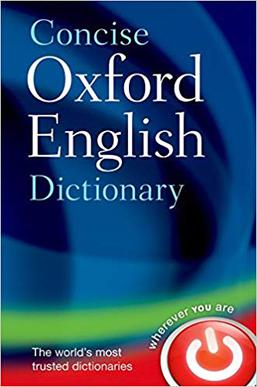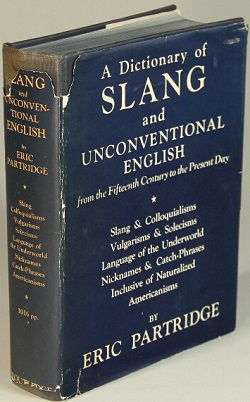
An encyclopedia or encyclopaedia is a reference work or compendium providing summaries of knowledge, either general or special, in a particular field or discipline. Encyclopedias are divided into articles or entries that are arranged alphabetically by article name or by thematic categories, or else are hyperlinked and searchable. Encyclopedia entries are longer and more detailed than those in most dictionaries. Generally speaking, encyclopedia articles focus on factual information concerning the subject named in the article's title; this is unlike dictionary entries, which focus on linguistic information about words, such as their etymology, meaning, pronunciation, use, and grammatical forms.
Gibberish, also known as jibber-jabber or gobbledygook, is speech that is nonsense: ranging across speech sounds that are not actual words, pseudowords, language games and specialized jargon that seems nonsensical to outsiders.

The Oxford English Dictionary (OED) is the principal historical dictionary of the English language, published by Oxford University Press (OUP). It traces the historical development of the English language, providing a comprehensive resource to scholars and academic researchers, as well as describing usage in its many variations throughout the world.
A thesaurus, sometimes called a synonym dictionary or dictionary of synonyms, is a reference work which arranges words by their meanings, sometimes as a hierarchy of broader and narrower terms, sometimes simply as lists of synonyms and antonyms. They are often used by writers to help find the best word to express an idea:
...to find the word, or words, by which [an] idea may be most fitly and aptly expressed

Merriam-Webster, Incorporated is an American company that publishes reference books and is mostly known for its dictionaries. It is the oldest dictionary publisher in the United States.

The Concise Oxford English Dictionary is one of the best-known of the 'smaller' Oxford dictionaries. The latest edition contains over 240,000 entries and 1,728 pages. Its 12th edition, published in 2011, is used by both the United Nations (UN) and NATO as the current authority for spellings in documents in English for international use. It is available as an e-book for a variety of handheld device platforms. In addition to providing information for general use, it documents local variations such as United States and United Kingdom usage.

The Macquarie Dictionary is a dictionary of Australian English. It is considered by many to be the standard reference on Australian English. It also pays considerable attention to New Zealand English. Originally it was a publishing project of Jacaranda Press, a Brisbane educational publisher, for which an editorial committee was formed, largely from the Linguistics department of Macquarie University in Sydney, Australia. It is now published by Macquarie Dictionary Publishers, an imprint of Pan Macmillan Australia Pty Ltd. In October 2007 it moved its editorial office from Macquarie University to the University of Sydney, and later to the Pan Macmillan offices in the Sydney central business district.
WordWeb is an international English dictionary and thesaurus program for Microsoft Windows, iOS, Android and Mac OS X. It is partly based on the WordNet database.

The Shorter Oxford English Dictionary (SOED) is an English language dictionary published by the Oxford University Press. The SOED is a two-volume abridgement of the twenty-volume Oxford English Dictionary (OED).

The Oxford Advanced Learner's Dictionary (OALD) was the first advanced learner's dictionary of English. It was first published in 1948. It is the largest English-language dictionary from Oxford University Press aimed at a non-native audience. Users with a more linguistic interest, requiring etymologies or copious references, usually prefer the Concise Oxford English Dictionary, or indeed the comprehensive Oxford English Dictionary, or other dictionaries aimed at speakers of English with native-level competence.

A Greek–English Lexicon, often referred to as Liddell & Scott or Liddell–Scott–Jones (LSJ), is a standard lexicographical work of the Ancient Greek language originally edited by Henry George Liddell, Robert Scott, Henry Stuart Jones, and Roderick McKenzie and published in 1843 by the Oxford University Press.

Kōjien is a single-volume Japanese dictionary first published by Iwanami Shoten in 1955. It is widely regarded as the most authoritative dictionary of Japanese, and newspaper editorials frequently cite its definitions. As of 2007, it had sold 11 million copies.

First published in 1918, Kenkyusha’s New Japanese-English Dictionary has long been the largest and most authoritative Japanese-English dictionary. Translators, scholars, and specialists who use the Japanese language affectionately refer to this dictionary as the Green Goddess or GG because of its distinctive dark-green cover.

The Longman Dictionary of Contemporary English (LDOCE), first published by Longman in 1978, is an advanced learner's dictionary, providing definitions using a restricted vocabulary, helping non-native English speakers understand meanings easily. It is available in four configurations:
The Daijisen is a general-purpose Japanese dictionary published by Shogakukan in 1995 and 1998. It was designed as an "all-in-one" dictionary for native speakers of Japanese, especially high school and university students.
The Australian Oxford Dictionary, sometimes abbreviated as AOD, is a dictionary of Australian English published by Oxford University Press.

The Oxford Dictionary of English (ODE) is a single-volume English dictionary published by Oxford University Press, first published in 1998 as The New Oxford Dictionary of English (NODE). The word "new" was dropped from the title with the Second Edition in 2003. The dictionary is not based on the Oxford English Dictionary (OED) – it is a separate dictionary which strives to represent faithfully the current usage of English words. The Revised Second Edition contains 355,000 words, phrases, and definitions, including biographical references and thousands of encyclopaedic entries. The Third Edition was published in August 2010, with some new words, including "vuvuzela".

A Dictionary of Slang and Unconventional English is a dictionary of slang originally compiled by the noted lexicographer of the English language Eric Partridge. The first edition was published in 1937 and seven editions were eventually published by Partridge. An eighth edition was published in 1984, after Partridge's death, by editor Paul Beale; in 1990 Beale published an abridged version, Partridge's Concise Dictionary of Slang and Unconventional English.

OfficeSuite is a cross-platform office suite application developed by MobiSystems. It has versions for Android, iOS and Microsoft Windows (PC) and adds extensive PDF abilities to its compatibility with the most frequently used Microsoft Office file formats. The software has over 220 million downloads on Google Play and is among the top Android business applications.

Mobile Systems Ltd., also known as MobiSystems, is a Bulgarian multinational software development company specializing in productivity software for Android, iOS, Microsoft Windows and Mac operating systems. The company’s products have been installed over 300 million times by users in 195 countries.














